Hello, everyone. Where I live, the beginning of August is actually when it starts to feel like fall. As if on cue, I awoke to a fly-by of geese noisily honking their way south. The elk are on the move, too. A herd of females and youngsters passed through my yard today, stopping just long enough to chomp on the geraniums I had planted in June.
As much as I love summer, this year I am really looking forward to fall. First and foremost, I can’t wait to meet many of you in Italy in October for my two Brain Health Retreats in Sicily. There are just a few spots left in each retreat; perhaps one of them has your name on it? Registration closes this week, so if you would like to join—email me (just reply to this newsletter) or click on the button below for more details.
My Rancho La Puerta retreat in Mexico this November has been sold out for months, but one casita just became available. It is perfect for two or three people to share. To inquire, click on the button below.
All this year on BHK, we have been talking about the importance of staying strong to support healthy aging.
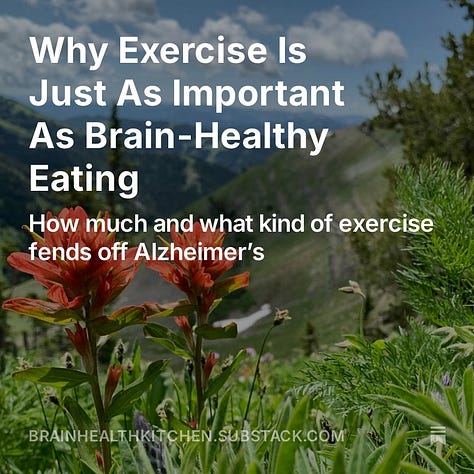
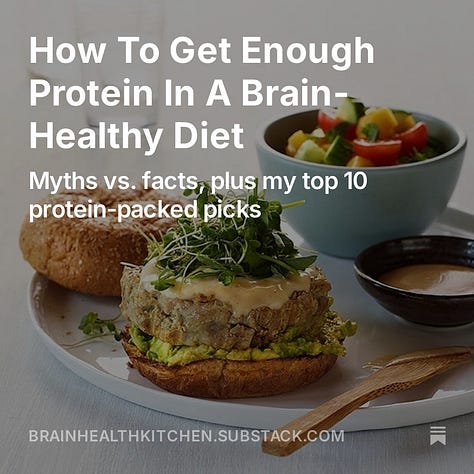
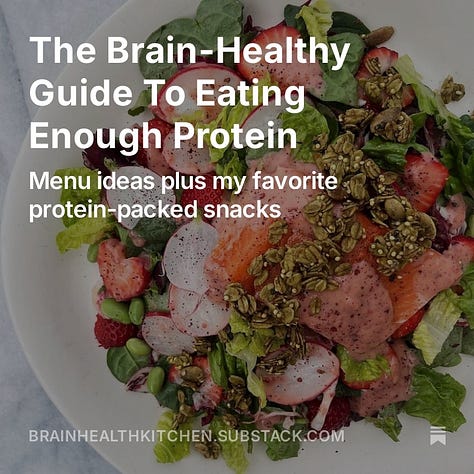
First, we went into why we lose muscle as we age and how maintaining muscle mass may help fend off cognitive decline.
Then, I showed you how to calculate protein needs based on your age and activity level.
I gave you my top 10 list of brain-healthy protein-rich foods, a protein meal prep guide, and a protein-packed meal plan, with recipes.
Most recently, we delved into the supplement creatine—how it works to help maintain or build muscle, how it may also be related to better brain health, and the do’s and don’ts of taking it.
The result? Many of you have told me that boosting protein has helped you feel more energetic and that you are craving less of the foods that aren’t good for you. And, many of you have created a strength training program that sticks, some for the first time ever. You have told me you are feeling stronger and seeing muscle gains. Bravo! I love hearing how you take action on what you’ve learned here on BHK. If you’ve had success in the realm, please share.
So for today’s newsletter, let’s take a look at another supplement you may be taking to stay strong: protein powder. What is it, exactly? And does it deserve a place in your supplement routine? If so, how do you know if a protein powder is good-quality—the right combo of amino acids that’s easy to digest and free of heavy metals? And what’s the better choice, plant or animal protein powder?
To be perfectly honest, I have a lot of mixed feelings about this supplement. I’ll get into that, below, as we weigh the pros and cons and put protein powder in perspective.
The first newsletter of the month is always free. Please share!
How muscle loss may fuel poor cognitive health

It’s worth repeating: maintaining muscle mass and healthy brain aging go hand in hand. Not only does muscle decline naturally with age, it becomes really difficult to build muscle after the age of 50. Anyone who has been laid up after a surgery can surely tell you how quickly muscles shrink and how difficult it can be to get them back.
In order to maintain or build muscle mass, two things are required: regular strength training + getting enough protein for your age and activity level.
That’s where protein powder comes in. Just like other supplements, protein powder can fill in the gaps that your diet may be missing. As many of you have commented here on BHK, it can be especially difficult to meet protein needs while juggling other dietary goals—like checking off the foods in the brain-healthy food groups while striving to be mostly plant-based. If that’s the case for you, the upside of sprinkling a scoop of protein powder into your food may outweigh any downside.
If you choose to supplement your protein intake, you’ll want to find the highest quality product that tastes good to you, doesn’t upset your stomach (yes, digestibility is a thing), and is within your budget. Over the past year, I have tried dozens of protein powders in my quest to find one that fits these criteria. Here’s my guide on how to read protein powder labels and pick a good product every time.
What is protein powder, exactly?
Here’s a recipe for making protein powder: Apply heat or enzymes to a whole food source of protein, such as milk, soy, or peas. Separate the isolated protein from the other components of the foods. Apply more heat or enzymes to turn the protein into a powder. Then, add other ingredients to make the protein taste good—things like added sugar, non-nutritive sweeteners, and flavors. Emulsifiers and thickeners can also be added to help make it dissolve more smoothly and have a pleasing texture.
Sounds like an ultra-processed food, doesn’t it? It’s true: if protein powder were a food (which it is not; it is a supplement), it would be considered ultra-processed according to the NOVA classification.
So you may be wondering if an ultra-processed form of protein is a smart addition to your diet. The truth is that we don’t know. There aren’t any studies looking at the long term health implications of consuming protein powder. What we do know is this: adults who maintain muscle as they get older are more likely to age with a healthier brain. And getting enough protein, as I mentioned above, is a key factor in that goal.
How To Choose A Protein Powder
All protein powders are not created equal. Some are even more ultra-processed than others. You can spot these by their long ingredient lists that include added sugar and excess sodium. Plus, some products use inexpensive methods to isolate the protein resulting in an inferior product that may be more likely to cause gastrointestinal side effects like bloating, cramping, diarrhea, constipation, and nausea. To find the just right protein powder for you, reading labels is key. And it will also involve a good measure of trial and error.
Tip: before commiting to a $40 tub of protein powder, purchase a sample packet. Many companies provide these travel packs, which are also the perfect size for you to try before you buy.
Plant vs Animal. Plant-based protein is the obvious choice if you don’t consume any animal products (including dairy, which is where whey protein comes from). In the vegan section, you’ll see products made from soy, hemp, pea, or a mix. Pretty much any high-protein plant will be represented.
Plant-based protein powders may be more planet-friendly, too, but they are often bitter-tasting and can cause more gastrointestinal side effects. Plus, they tend to fall short on a crucial amino acid for protein muscle synthesis: leucine. (More on that below.) Plant-based powders, however, have really improved in recent years and I can recommend a few brands that taste great (stay tuned for my recs in the next post).
Animal-derived protein powders usually come from whey, but you’ll also see beef, casein, egg white, and even cricket protein. (I have tried the cricket powder! Yes, it tastes like crickets, a common source of protein in central Mexico.) Whey protein powders have the advantage of providing more grams of protein per scoop, a complete amino acid profile, and are known for better digestibility.
Amino acid composition. Amino acids are the building blocks of protein. Muscle building requires three specific amino acids (called branch chain amino acids (BCAA)): leucine, iso-leucine, and valine. Whey protein naturally provides all the amino acids muscle needs. Plant protein sometimes fall short. That’s why you’ll often see a mix of different plant sources in an attempt to create a complete amino acid profile.
Grams of protein. Whey protein powder usually provides 20 to 25 grams of protein per serving. Vegan protein powders can contain anywhere from 15 to 25 or more grams per serving.
Ingredients and Additives: All products have added ingredients to make them taste better and dissolve well in liquid: added sugars, non-nutritive sweeteners (NNS), binders, emulsifiers, and sodium. Finding a high-quality product often means choosing one with the least bad combination of these things.
Third Party Testing. It’s important to choose a protein powder from a reputable brand that undergoes testing for purity, quality, and safety. Protein powders are not regulated by the Food and Drug Administration (FDA), so third party testing is key. Look for NSF Certified on the label, an organization that ensures the product meets industry standards and is free from heavy metals, such as lead, cadmium, aluminum, and arsenic. This is especially important with plant-based protein powders as plants accumulate heavy metals from the soil.
Cost: Prices range from 50 cents to several dollars per serving. While I am not against bargain shopping, be aware that the least expensive powders may contain more additives in an attempt to make a poor quality protein taste good.
Putting protein powder in perspective
As you can see, there are pros and cons to supplementing with a protein powder. On one hand, healthy aging requires getting enough protein for your age and activity level. Protein powders are convenient, a boon on busy days. They are easy to include in your diet, especially if you enjoy having a smoothie as a meal or post-workout snack.
On the other hand, protein powder is a processed food that often comes with things you may want to limit or avoid in a brain-healthy diet. They can be expensive, especially when compared to an equivalent serving of a protein-rich food like eggs or nuts. If consumed daily, many products can give you an extra dose of sugar and the unwanted calories that come with it. And, protein powders can have unwanted gastrointestinal side effects.
As with all food choices, it’s most important to take a look at your overall dietary pattern. Ask yourself:
Are you consuming high-quality sources of protein from real food every day, things like tofu, beans and lentils, nuts and seeds, fish, poultry, eggs, yogurt, and a wide variety of vegetables?
Are you able to hit the recommended servings of brain-healthy food groups in a usual week?
If so, adding a scoop of protein powder a day may be a good fit for your brain-healthy lifestyle. But if you are using supplements throughout the day to replace meals, you may be missing out on the most bioavailable forms of brain health nutrients that you need.
Next time, I’ll give you some ideas for cooking with protein powder and share a few of my favorite brands. And I am very excited to give you my new recipe for protein-packed power bars. After much kitchen testing, I have finally arrived on a recipe that is truly delicious and easy. I can’t wait to share.
Catching up on BHK this summer
This summer, I hope you’ve been trading screen time for enjoying the outdoors. If you’re behind on reading BHK, don’t worry. I’ve gathered the summer’s most shared articles here so you can catch up.


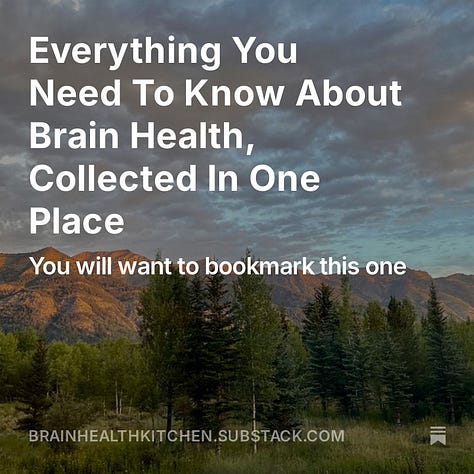
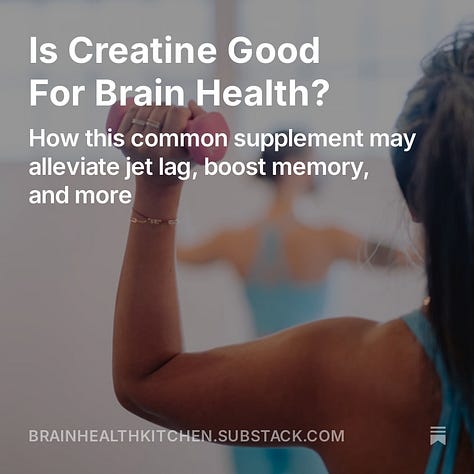
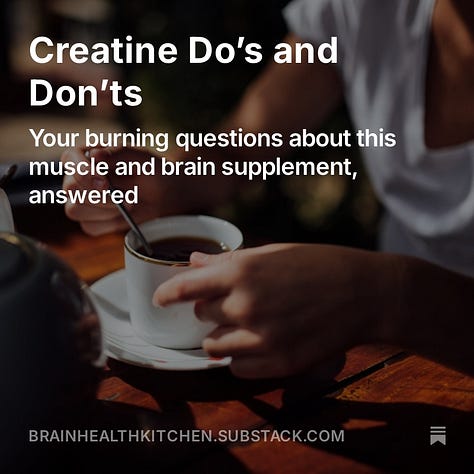

Coming soon to BHK
I am excited to share two new Brain Health Retreats in Italy for spring of 2025! Be sure you are signed up as a paying subscriber to get first dibs on spots, along with full access to these upcoming articles:
An Updated BHK Guide to Supplements
Magnesium Supplements and Brain Health
Air-Fryers—Better For You Than Frying?
I’ll be back this weekend with that power bar recipe. Until then, thank you for reading, sharing, and taking the best care of your brains.
Love,
Annie
Brain Health Retreats
Ortigia, Sicily October 13 to 19, 2024: Join me in the ancient city of Ortigia in southeast Sicily on this culinary adventure. We’ll cook with local chefs, tour almond, avocado, and olive farms, and learn all about olive oil.
Palermo, Sicily October 27 to November 2, 2024: Join me in the vibrant city of Palermo and explore less-traveled western Sicily. We’ll visit farms and cook local dishes, while soaking up the beauty of ancient Greek temples, medieval villages, coastal salt flats, and maybe even get to see olive oil pressed!
Costa Rica, January 9 to 14, 2025. If a cozy cabaña nestled in the jungle near the beach is more your style, join me on this 6-day brain health retreat. We’ll enjoy energizing yoga, plant-based cuisine, waterfall walks and a comprehensive brain health education in this jungle oasis.

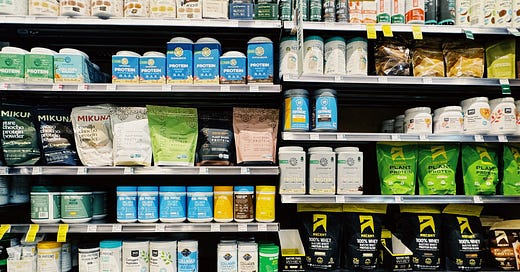




Thanks for this post, Annie! I am very much looking forward to your specific recommendations and the recipe.
Any thoughts on Collagen protein vs whey?